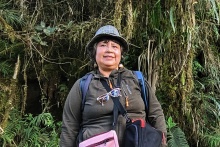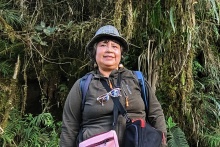The climate crisis is the most pressing issue of our times, impacting our lives and entire ecosystems. It threatens progress on gender equality, human rights, and sustainable development. By 2050, climate change will push up to 158 million more women and girls into poverty.
Exposing the climate and biodiversity crisis is the first step towards beginning to find solutions. Yet, dis- and misinformation campaigns continue to challenge scientific knowledge and information about the unfolding crisis, clouding people’s understanding and risking our future. Against this backdrop, the freedom and safety of journalists reporting from the front lines of the climate crisis is critical. This year, World Press Freedom Day (3 May) is focusing on the importance of journalism and freedom of expression in the face of the environmental crisis.
On this occasion, UN Women interviewed Miriam Jemio, an independent environmental journalist from La Paz, Bolivia. Jemio was among 163 Bolivian journalists who received training in design thinking and reporting on gender-based violence through a Media Lab project by UN Women and the Foundation for Journalism in December 2023.
‘Access to information is the basis of democracy’ – Interview with environmental journalist Miriam Jemio on World Press Freedom Day
The importance of environmental journalism in the face of dis- and misinformation
Miriam Jemio has been a journalist for nearly three decades. For most of her career, she has almost exclusively covered environmental issues, because she considers them to be as important as political or economic issues.
For Jemio, it is incredibly important to reflect the socio-environmental crises that indigenous and rural women are facing, with empathy and sensitivity. “It is essential to cover indigenous issues, because they are a vulnerable population”, she said. “Two decades ago, I had the opportunity to visit many rural municipalities and when I compare their condition today with what I had seen then, there have been very few changes.”
“Therefore, it is necessary to make their needs visible, to show where the State is not fulfilling its duty, and to show the specific ways that the indigenous peoples face social and environmental problems.”
Jemio reported from COP 15 events in 2009, highlighting the stories of indigenous peoples from the Amazon who were facing the impacts of climate change.
“Coverage of environmental issues is essential in the face of the crises we face as humanity, and to combat the disinformation that preys on the public”, she said. “We have to show who is behind the disinformation, expose their interests, and provide verified information to the public so that they can make informed decisions, and we can protect the planet that houses all of us.”
But there is another challenge that haunts her: “how to motivate our audience to take action. We are now turning to “solutions journalism” to inspire action”, she said.
The climate crisis impacts women differently
“Extractivism and the climate crisis have profound socio-environmental impact on indigenous populations, but these impacts affect women differently (than men),” said Jemio. “Women are the ones to face and respond to the effects of climate change, but their role is not understood, much less made visible.”
She gives the example of indigenous women in the Chiquitanía (a region in eastern Bolivia), whose traditional care responsibilities for their families include fetching water. “Water is increasingly scarce, making it more difficult for them to access it. In the Chiquitanía, there are seasons when women have to travel to another community or even to the nearest city to bring water to their homes.”
“And when excessive rainfall causes flooding, women are the first to respond to save their children and animals. In many communities, indigenous women grow kitchen gardens to cover their nutritional needs. When they lose their crops (because of lack of water or during floods) they do not have enough to cook and feed their families.”
Safety of journalists and press freedom
“In Bolivia, due to the polarization in the country, several journalists have been verbally and physically attacked in recent years. Environmental journalists are in the crosshairs of the mining actors and journalists are often labeled as being “with” or “against” the government”, shared Jemio.
In 2019, while doing a live broadcast, Jemio was verbally and physically assaulted by a group of protesters. “I felt very vulnerable, it was a mixture of rage and helplessness, because I could not defend myself and I had to flee”, she recalled.
“The security to do our work must be provided by the State”, Jemio stressed. Her message on World Press Freedom Day is clear: “Access to information is the basis of democracy. That is what we are losing if journalists cannot safely cover issues such as the climate crisis, deforestation, biodiversity loss, extractive activities… the public will not have the information they need to take action on issues that affect their lives.”

